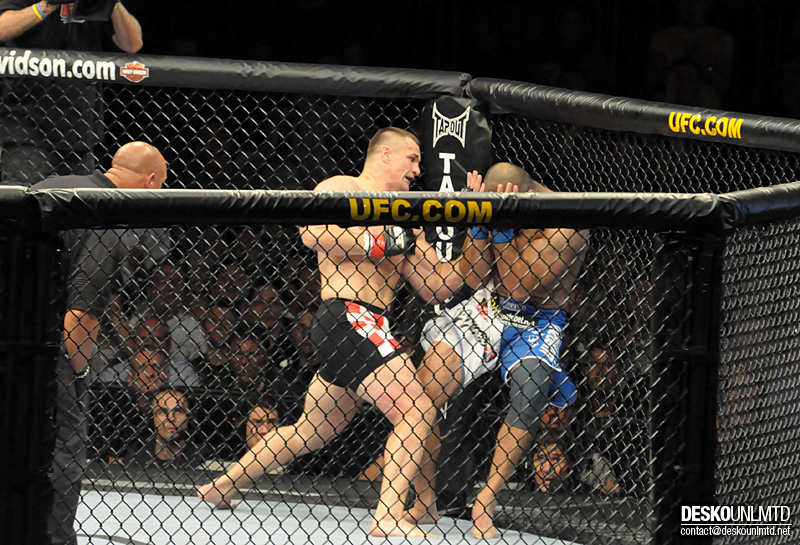The UFC has fallen in line with other major sports leagues in the USA, officially removing cannabis from its list of prohibited substances for 2024, following a trend of evolving policies in American sports regarding cannabis use among athletes. Other major sports organizations that have modified their stance on cannabis, include the NFL, NBA, and MLB, moving away from punitive measures.
UFC Removes Cannabis from Its Prohibited Substances List


The Ultimate Fighting Championship (UFC), which governs most Mixed Martial Arts (MMA) fights in the United States, announced that as of December 31, 2023, cannabis will be officially removed from its list of prohibited substances, aligning with other sports leagues in the USA.
For more news like this, along with all the latest in legalization, research, and lifestyle, download our free cannabis news app.
Shift in Cannabis Policy
In 2021, the UFC had decided that its athletes would no longer be penalized for testing positive for THC. Positive tests for carboxy-THC, a metabolite of THC, were already not considered a violation “unless there was additional evidence that an athlete intentionally used it for performance enhancement purposes.”
Objectives of the New UFC Policy
According to Hunter Campbell, Chief Business Officer of the UFC, the new policy aims to raise the standards of health and safety in combat sports, positioning the UFC’s anti-doping program as the most effective and progressive in professional sport. Campbell emphasized the commitment to fair competition, stating the continuation of an independently administered anti-doping control program for all UFC athletes.
Evolution of the UFC Policy
Jeff Novitzky, Senior Vice President of Athlete Health and Performance for the UFC, described the policy as a “living and breathing document,” highlighting its continuous evolution based on input from athletes and third-party experts. This dynamic approach reflects a broader trend in American sports, where policies relating to cannabis are undergoing significant transformations.
Comparing the UFC with Other Sports Leagues
National Football League (NFL)
The National Football League (NFL) made a notable change in 2021 by modifying its cannabis testing procedures during the offseason and adjusting THC test thresholds. The NFL has moved from punitive measures to a treatment-focused approach, with players exceeding THC limits now subject to medical intervention and addiction treatment.
National Basketball Association (NBA)
Similarly, the National Basketball Association (NBA) has removed cannabis from its list of prohibited substances, allowing players to consume cannabis and invest in related businesses under certain conditions. The NBA’s collective bargaining agreement, which came into effect on July 1, 2023, emphasizes responsible use of cannabis, prohibiting players from being under the influence of the substance during games, training, or team meetings.
Major League Baseball (MLB)
Major League Baseball (MLB) also no longer screens for cannabis in its players since 2019.
World Anti-Doping Agency’s Stance
The World Anti-Doping Agency (WADA) maintains its ban on THC, citing concerns about its potential effects on performance, health risks, and violations of the spirit of sport. This stance drew criticism when American runner Sha’Carri Richardson was suspended from the Tokyo Olympics in 2020 following a positive cannabis test. CBD, however, was removed from the list of doping substances in 2018.
Cannabis Use in Sports
Many retired athletes have openly spoken about using cannabis to manage pain and aid recovery during their active careers. A recent survey found that 93% of participants believed CBD helped with recovery after exertion, while 87% said the same for THC.
Medical Professionals’ Views on Cannabis in the UFC and Sports
Sports medicine professionals are increasingly expressing positive attitudes towards cannabis consumption. A survey revealed that 72% of respondents supported the removal of CBD from WADA’s banned substances list in 2018, and 59% advocated for the removal of cannabis in its entirety. Additionally, the majority of respondents do not consider CBD (76%) and THC (66%) to be performance-enhancing substances.
Study on Cannabis and Brain Trauma
A study conducted in 2023 highlighted the potential benefits of regular cannabis use to offset the impact of repeated head traumas, suggesting a promising path for athletes, including boxers, football, and soccer players, seeking to mitigate the risk of long-term brain injuries.
—
(Featured image by dankos-unlmtd (CC BY-NC-ND 2.0) via Flickr)
DISCLAIMER: This article was written by a third-party contributor and does not reflect the opinion of Hemp.im, its management, staff, or its associates. Please review our disclaimer for more information.
This article may include forward-looking statements. These forward-looking statements generally are identified by the words “believe,” “project,” “estimate,” “become,” “plan,” “will,” and similar expressions. These forward-looking statements involve known and unknown risks as well as uncertainties, including those discussed in the following cautionary statements and elsewhere in this article and on this site. Although the company may believe that its expectations are based on reasonable assumptions, the actual results that the company may achieve may differ materially from any forward-looking statements, which reflect the opinions of the management of the company only as of the date hereof. Additionally, please make sure to read these important disclosures.
First published in Newsweed, a third-party contributor translated and adapted the article from the original. In case of discrepancy, the original will prevail.
Although we made reasonable efforts to provide accurate translations, some parts may be incorrect. Hemp.im assumes no responsibility for errors, omissions or ambiguities in the translations provided on this website. Any person or entity relying on translated content does so at their own risk. Hemp.im is not responsible for losses caused by such reliance on the accuracy or reliability of translated information. If you wish to report an error or inaccuracy in the translation, we encourage you to contact us.



Comments are closed for this post.